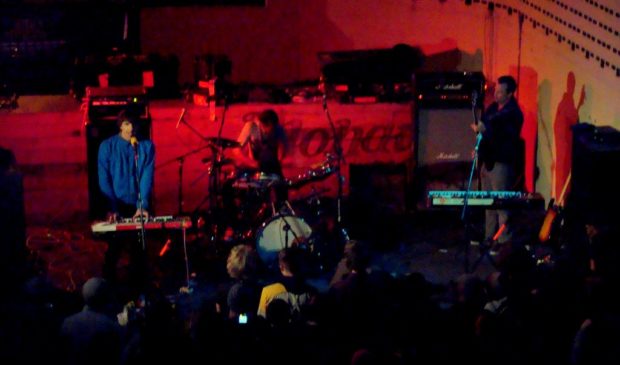About the Author
Chad Swiatecki is a 20-year journalist who relocated to Austin from his home state of Michigan in 2008. He most enjoys covering the intersection of arts, business and local/state politics. He has written for Rolling Stone, Spin, New York Daily News, Texas Monthly, Austin American-Statesman and many other regional and national outlets.
Newsletter Signup
The Austin Monitor thanks its sponsors. Become one.
Most Popular Stories
- Austin Resource Recovery to formally amend cart collection rules
- Austin ISD gets $41 million from the Education Department. What happens if the agency closes?
- Council approves grant award to replace Barton Springs Road Bridge
- Firefighters, city reach agreement on retirement fund
- Rite of spring: Dog-killing algae makes an early appearance in Austin waterways
-
Discover News By District

Music groups take aim at the ballot box with new nonprofit
Monday, September 10, 2018 by Chad Swiatecki
Two months before the November midterm elections, a consortium of businesses and nonprofits involved in Austin’s music industry have banded together with the goal of having a greater influence at the ballot box.
The new Music Moves Austin 501(c)(4) nonprofit has joined together representatives from Austin Music People, the Red River Merchants Association, the Urban Artist Alliance, the Music Venue Alliance, EQ Austin, C3 Presents, and South by Southwest. The group’s short-term plans include registering 2,500 new voters in time for the fall election, and hosting candidate forums in early October for the city’s mayoral and four contested City Council seat races.
Funded by an unnamed private donor, the group is the latest to try to marshal Austin’s large but diffuse community of musicians and creatives, who have been singled out as being especially threatened by the city’s rising cost of living.
Austin Music People was the most recent nonprofit to act as a political organizing and local lobbying entity for the music community, but that group reorganized and recently changed its focus to furthering the interests of the city’s events and festivals economy.
Nick Shuley, president of Music Moves Austin, said he’s hopeful a strong push into the November election will create urgency for Austin’s musicians around the races and ballot issues that could impact them.
“As much as there is a stereotype for Austin of everyone being so independent that no one wants to work together, I’ve found that when you get people to open up there is effort to collaborate and a willingness to work on things that matter to them,” he said. “When you look at the (voting) numbers on local elections, if you have a group that represents 2,500 voters, that’s a significant number. I can’t tell you what motivates the candidates, but if you can bring a significant number to the table, that’s not going to hurt your cause.”
Along with the race for mayor and Council seats in districts 1, 3, 8 and 9, the November election also includes a slate of bond proposals including a $250 million measure to create affordable housing and a cultural spaces funding measure that could provide $12 million for music, though the exact mechanism for using that money is still unclear.
The group plans to distribute a questionnaire focused on music-related issues to all the city candidates in this fall’s election. The forums will take place at Antone’s nightclub, with candidates for the mayor’s race and District 3 appearing Oct. 1. Candidates for districts 1, 8 and 9 will appear on Oct. 2.
To reach its registration goal, Music Moves Austin will have registrars at music venues in downtown Austin until the Oct. 9 registration deadline.
Cody Cowan, general manager of the Mohawk nightclub and the recently named executive director of the Red River Cultural District, said he hopes the heavy traffic of the district’s fall schedule will make it possible to reach enough voters and get them engaged on relevant issues.
“The disenfranchisement of artists and people who are renters is a drag and it’s kind of baffling,” he said. “People feel kind of hopeless and nothing is ever going to change, so why even try? But we know we’re on the precipice as far as the live music experience, where there’s lots of opportunity to create something more robust and sustainable, or, if people don’t stand up, it might go away.”
Cowan said the group also has lots of work to do as far as educating local politicos on the development, permitting and other issues that are presenting a greater threat to Austin’s musicians, venues and other related entities.
“One thing that caught me off guard since I started engaging in this effort is I just assumed everyone loved music and that’s part of why you live in Austin, but I’ve learned life is more diverse than that. There are folks who know about music but don’t stay up late to go out and don’t understand what the concerns are,” he said. “That even goes for a lot of the staff in the city, where you tell them what you’re going through and they say, ‘We don’t get the problem.’”
Photo by Lesheifner [Public domain], from Wikimedia Commons.
The Austin Monitor’s work is made possible by donations from the community. Though our reporting covers donors from time to time, we are careful to keep business and editorial efforts separate while maintaining transparency. A complete list of donors is available here, and our code of ethics is explained here.
You're a community leader
And we’re honored you look to us for serious, in-depth news. You know a strong community needs local and dedicated watchdog reporting. We’re here for you and that won’t change. Now will you take the powerful next step and support our nonprofit news organization?


